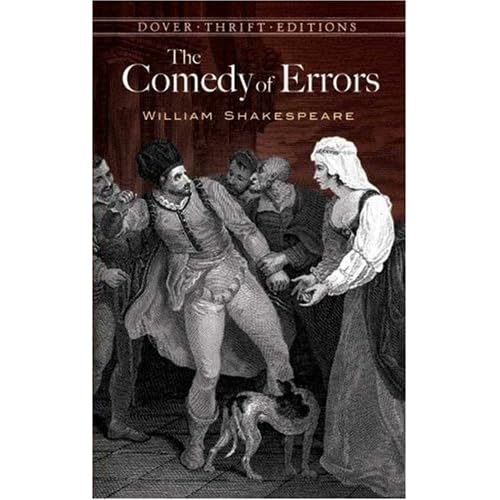 --The blurb--
--The blurb--"Shipwrecked many years before the start of the play, Aegeon of Syracuse searches vainly for his lost wife, one of his twin sons and one of their twin servants. Landing in Ephesus he falls foul of an obscure law condemning him to death unless he pays an enormous fine within 24 hours. The clock starts ticking and the action of the play begins to unfold. Aegeon is not aware that his son, Antipholus of Syracuse and his servant Dromio, have also landed in Ephesus, but even worse, it soon becomes clear to the audience that Ephesus is also the home of the lost twin and servant, Antipholus and Dromio of Ephesus.
So begins the comedy of errors, as the pairs of twins are repeatedly and hilariously mistaken for each other, much to the consternation of their friends, creditors and lovers. Yet the play is also shot through with more serious issues. The sentence of death hangs over the father from the very beginning of the play, strange things happen to time as the play progresses, and the space of trade and the marketplace are never far away. The Comedy of Errors is a much neglected play which is only now achieving the critical and theatrical attention it deserves."
from www.amazon.co.uk
--The review--
As a one-time English student, I've had plenty of exposure to Shakespeare and his contemporaries, culminating in a grand tour of the stage from ancient to modern as my dissertation, which of course made a stop in Shakespeare Land. The Comedy of Errors, however, was never one of the stops along the way, often overshadowed in favour of the more famous comedies. It's easy to see why this overshadowing has taken place: it isn't Shakespeare's most beautiful or funny or characterful play, and most of the jokes seem to rely on the infidelity and inattentiveness of the play's menfolk. It is generally not as strong as the other plays in either character or plot; act II in particular is especially laboured, and the feduciary strand of the storyline is not as lucid as either the character-based storylines in this play or the money-based stories in other plays.
However, this is not to say that you should put down the Comedy of Errors before you've even begun. There are certainly some eloquent moments, particularly in Act I and Act V:
"I to the world am like a drop of water
That in the ocean seeks another drop,
Who, falling there to find his fellow forth,
Unseen, inquisitive, confounds himself:"
"Though now this grained face of mine be hid
In sap-consuming winter's drizzled snow,
And all the conduits of my blood froze up,
Yet hath my night of life some memory,
My wasting lamps some fading glimmer left,
My dull deaf ears a little use to hear:"
These gems, demonstrating Shakespeare at his finest, make the play worth reading for these passages alone, but there are more high points in store, especially if you are a dramatist. Some of the stage directions, for instance, are delightfully inspecific in their time period, e.g. "a public place", which allows we 21st-century readers to easily imagine or represent Antipholus and Dromio of Syracuse meeting in, say, a modern cafe or nightclub, should we so choose. Equally, while the iambic pentameters are relentless and can seem heavy and dogged on the page, experience suggests that this effect is for the most part banished in performance, leaving only the positive effects of the metre, thanks to suitably talented actors and the dexterity of the human voice.
The characters in this play are generally difficult to relate to, but the scenes between Luciana, Antipholus and Adriana are really very amusing, and the sisters and Aegeon are arguably the bolts that hold this play together. Act III is generally the most amusing of the five, and the stichomythic passages in acts III and IV are also very effective, accelerating pace and humour both on the page and on the stage. The popular Shakespearean theme of identity crisis appears in this play, and to great success, though it is again perhaps more easily decoded in performance than as a reader.
Being a comedy, all ends happily, and as with the vast majority of Shakespeare plays, multiple readings are warranted in order to truly gain the most from the play's details and subtleties (whether dialogic, character-based or plot-based). So, as a reader, I instruct you to have your imagination at the ready and proceed with abandon.
Other Shakespearean comedies
All's Well That Ends Well
As You Like It
Love's Labour's Lost
Measure for Measure
The Merchant of Venice
The Merry Wives of Windsor
A Midsummer Night's Dream
Much Ado About Nothing
Pericles
Taming of the Shrew
The Tempest
Twelfth Night
The Two Gentlemen of Verona
The Two Noble Kinsmen
The Winter's Tale
*Recommended editions: Arden, New Penguin, Cambridge School Shakespeare





2 comments:
love your blog! researching comedy of errors for a project... for those reading this, here's another great article:
/www.life123.com/arts-culture/theatre/comedy/shakespeares-comedy-of-errors.shtml
Thank you for visiting and commenting! I'm afraid I've let my posting slip a little lately, but here's hoping that my resolve strengthens and that as a result you will visit again :) Good luck with your project.
Post a Comment